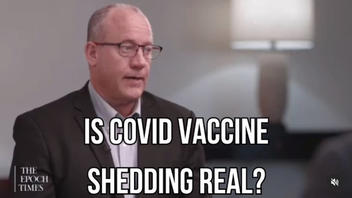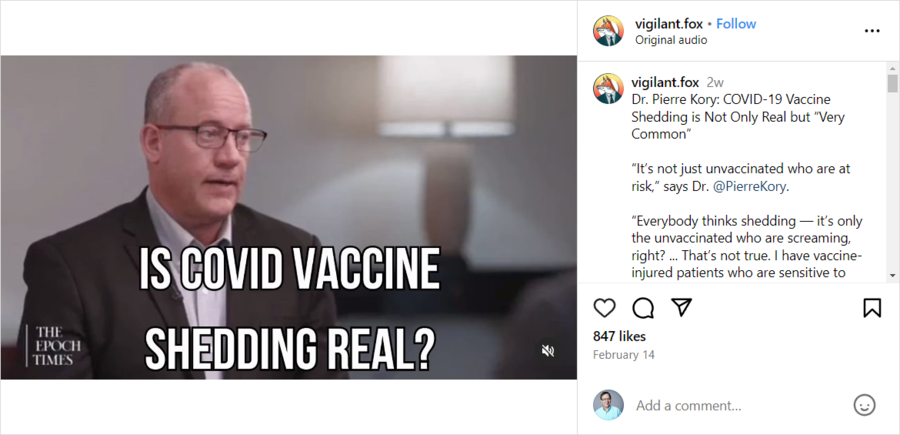
Is COVID-19 vaccine shedding real, meaning it can spread from person to person? No, that's not true: The COVID-19 shots authorized for use in the United States do not contain the live virus and therefore cannot replicate in the body or be shed. Additionally, infectious disease experts told Lead Stories that there's no credible scientific evidence supporting the claim.
The claim appeared in a post and video (archived here) on Instagram by The Vigilant Fox 🦊 on February 14, 2024, under the on-screen title "IS COVID VACCINE SHEDDING REAL?" The post's caption said:
Dr. Pierre Kory: COVID-19 Vaccine Shedding is Not Only Real but 'Very Common'
'It's not just unvaccinated who are at risk,' says Dr. @PierreKory.
'Everybody thinks shedding -- it's only the unvaccinated who are screaming, right? ... That's not true. I have vaccine-injured patients who are sensitive to being exposed to other vaccinated [people].'
'I think shedding is very common.'
This is what the post looked like on Instagram at the time of writing:
(Source: Instagram screenshot taken on Thu Feb 29 16:36:32 2024 UTC)
The video
The man featured in the video is Dr. Pierre Kory, a physician affiliated with the Front Line COVID-19 Critical Care Alliance (FLCCC), an organization known for promoting unproven claims about the COVID-19 virus. FLCCC was cited by the editors of Frontiers in Pharmacology for such claims and an article published by members of the organization in was taken down. Kory is a founding member of FLCCC.
During the nearly 3½-minute clip, he says COVID-19 vaccine shedding is real and hurting or injuring people. The full 46-minute 16-second version of the video appears on The Epoch Times website (archived here).
Infectious disease experts
In a February 29, 2024, email to Lead Stories, Dr. Amesh Adalja, a senior scholar at the Johns Hopkins Center for Health Security, refuted those claims. He said:
- No, there is no evidence that the routine COVID-19 vaccines used shed anything of consequence.
- No, this doesn't occur with this type of vaccine.
Bill Hanage, an associate professor of epidemiology at the Harvard T.H. Chan School of Public Health, echoed Adalja's comments in another February 29, 2024, email, also answering "No" to both claims.
Centers for Disease Control and Prevention
The vaccine-shedding concept promoted in the video circulates often enough that the Centers for Disease Control and Prevention (CDC) has included it on its "Bust Myths and Learn the Facts about COVID-19 Vaccines" page (archived here). The CDC website says:
COVID-19 vaccines recommended for use in the United States do not shed or release their components.
FACT: Vaccine shedding is the release or discharge of any of the vaccine components in or outside of the body and can only occur when a vaccine contains a live weakened version of the virus.
None of the vaccines recommended for use in the U.S. contain a live virus. None of the COVID-19 vaccines recommended for use in the U.S. contain a live virus. mRNA and protein subunit vaccines are the two types of currently authorized COVID-19 vaccines available in the U.S.
Types of U.S. COVID-19 vaccines
Neither of the three COVID vaccines approved for use in the United States are live-virus vaccines. The shots from Pfizer and Moderna are mRNA vaccines. The Novavax shot is a protein subunit vaccine. The CDC website has details (archived here) on all of them:
mRNA COVID-19 vaccines
Pfizer-BioNTech and Moderna COVID-19 vaccines are mRNA vaccines. mRNA vaccines use mRNA created in a laboratory to teach our cells how to make a protein--or even just a piece of a protein--that triggers an immune response inside our bodies. The mRNA from the vaccines is broken down within a few days after vaccination and discarded from the body. ...
Protein subunit COVID-19 vaccines
Novavax COVID-19 vaccine is a protein subunit vaccine. Protein subunit vaccines contain pieces (proteins) of the virus that causes COVID-19. The virus pieces are the spike protein. The Novavax COVID-19 vaccine contains another ingredient called an adjuvant. It helps the immune system respond to that spike protein. After learning how to respond to the spike protein, the immune system will be able to respond quickly to the actual virus spike protein and protect you against COVID-19.
Live virus vaccines
There are vaccines approved for use in the United States that do contain live viruses but none of them are being used to fight coronavirus. Hanage provided an example in his email response:
Some vaccines are made of live viruses that have been genetically altered to be safe, but which can still replicate in humans. These can be shed for a brief period. An example is Oral Polio Vaccine, which was recommended in the US between 1963 and 2000.
The U.S. Department of Health and Human Service website (archived here) provides additional details:
Live-attenuated vaccines
Live vaccines use a weakened (or attenuated) form of the germ that causes a disease.
Because these vaccines are so similar to the natural infection that they help prevent, they create a strong and long-lasting immune response. Just 1 or 2 doses of most live vaccines can give you a lifetime of protection against a germ and the disease it causes.
But live vaccines also have some limitations. For example:
- Because they contain a small amount of the weakened live virus, some people should talk to their health care provider before receiving them, such as people with weakened immune systems, long-term health problems, or people who've had an organ transplant.
- They need to be kept cool, so they don't travel well. That means they can't be used in countries with limited access to refrigerators.
Live vaccines are used to protect against:
- Measles, mumps, rubella (MMR combined vaccine)
- Rotavirus
- Smallpox
- Chickenpox
- Yellow fever
U.S. Food and Drug Administration
A March 1, 2024, email response by Food and Drug Administration (FDA) spokesperson Jeremy Kahn to a Lead Stories inquiry about the social media post said the "FDA takes its responsibility for ensuring the safety, effectiveness and manufacturing quality of all vaccines approved or authorized for emergency use in the U.S., including the COVID-19 vaccines, very seriously." He added:
The content within this video post is representative of the ongoing proliferation of misinformation and disinformation about the overall safety of vaccines which results in vaccine hesitancy and lowers vaccine uptake.
Read more
Additional Lead Stories fact checks of claims about vaccines can be found here.















